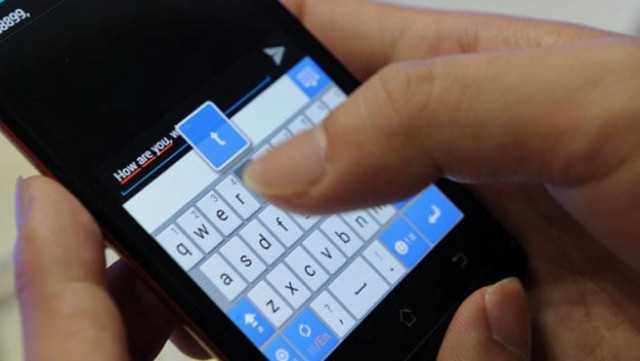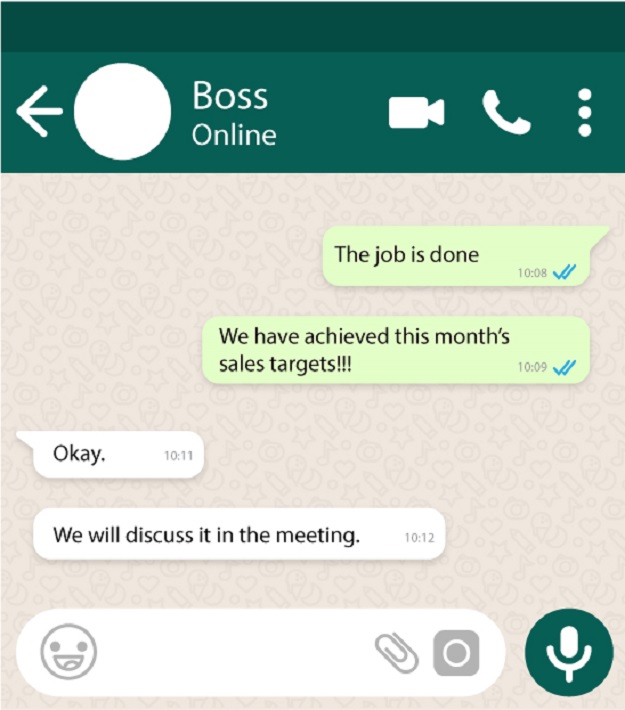Cyberlinguistics: What's in a full-stop?
In online conversations, punctuation may carry more implicit meanings than we think

PHOTO: AFP
The conversation went something like this.
Ufaq: Hey Salman! What's up? [smile emoji] how are you doing?
Salman: I am okay.
Ufaq: Would you like to meet for coffee on Saturday?
Salman: Yeah, sure. We can.
"It seemed as if he was in a bad mood or simply not interested in holding a conversation," Ufaq, who works for the corporate sector, explained.
Even though there was apparently nothing wrong with Salman's reply, Ufaq thought that it looked "dull and angry."
The reason: Salman put a period at the end of his sentence – something that made all the difference.
"The big thing about language is that it always changes," David Crystal, the author of "Making a Point: The Persnickety Story of English Punctuation," wrote in his book.

Speaking of which, the arrival of the internet has certainly changed the way people use language in all areas of cyber activity, including emails, chatrooms, instant messaging, and associated areas of computer-mediated communication (CMC) such as SMS messaging or texting.
Missing or wrong punctuation marks – or even wrong placement of punctuation marks – can completely change the meaning and context of a sentence. Therefore, the use of right punctuation marks has always been stressed in formal writing.
With online communication increasingly becoming the order of the day, however, the idea behind the use of punctuation has drastically changed. When seen in the context of online conversations, punctuation marks carry feelings too – but in subtle ways that are sometimes easy to miss or misunderstand, as seen in Ufaq's case.
"The internet has certainly changed the way we use our language. [On social media], sentences have become shorter and conversational, spellings have shrunk and the meaning of punctuation marks have changed," said Dr Bushra Ahmed Khurram, assistant professor of linguistics at the University of Karachi.
"When writing social media posts, emails or text messages, people behave as if they are holding a face-to-face conversation, therefore, they use different elements to convey their emotions, like emoji, symbols, punctuation marks, and capital letters to lay emphasis on specific words or sentences," she explained.
Why are full stops considered angry?
Punctuation marks form the backbone of any language and although all types of punctuation marks are important, a period (or full stop) is considered crucial in formal language because it marks the end of a sentence.
When it comes to online chatting and texting, however, the usage of the period – or lack thereof – has become more complex with the passage of time.
"I will say that I hadn't noticed the full stop disappearing in texts until I started leaving them out myself," Keith Houston, author of Shady Characters: The Secret Life of Punctuation, Symbols, and Other Typographical Marks, told The Express Tribune. "To me, the way that text messages are presented in little speech bubbles, where each message is very strongly self-contained, means that a full stop sometimes seems a little redundant – even aggressively so."
Houston explained that if a message has already visibly ended (because it's very obviously constrained to an on-screen graphical element), adding an additional character that shouts "OKAY, I"M FINISHED NOW" is a little unnecessary.
"Of course, in a text with more than one sentence, you have little choice but to use full stops," Houston added.
The exclamation point and the excitement
Exclamation points have always been used to express excitement, surprise, astonishment, or any other such strong emotion. When it comes to online communication, however, the exclamation point has become a sincerity marker.
"You have done a good job." The period at the end of the sentence, for instance, gives a sarcastic tone to the message, especially when the sentence is used in an official email. As against that, "You have done a good job!" shows that the sender conveyed warmth and sincerity with the message.
Houston, however, had a different explanation.
"I do find myself using them these days to give my messages a little more emphasis, as if to say, "I really meant that sentence I just wrote!" he said. "Even so, I'm not necessarily trying to convey sincerity as much as trying to inject a little more life into what can feel like a very constricting medium."
The action-packed asterisks
In formal writing, an asterisk – the starlike sign – is used as a footnote symbol to show that the writer is planning to comment on something at the bottom of the page.
On the internet, however, asterisks carry a different meaning altogether. According to linguist John Gruber, in online communication, bounding asterisks are used as a form of emphasis and to signal non-verbal noises or actions.
"I am really bored with this lecture (*yawn*)," "I miss the days when I was younger (*signs*)".
The ambiguous ellipsis
In formal writing, ellipsis – or the three dots used in between or at the end of a sentence – represents an omitted section of text. In online communication, it is used differently.
In his research paper titled The power of dots: Using nonverbal compensators in chat reference, Jack M Maness from the University of Colorado at Boulder specifically focused on ellipses and dashes in online communication and how people use them to supplant more traditional forms of punctuation.
"Although an ellipsis is technically complete with three periods (...), its rise in popularity as a "trailing-off" or "silence" indicator, particularly in the mid-20th-century comic strip and comic book prose writing, has led to expanded uses online," he wrote.
"Today, however, extended ellipsis anywhere from two to dozens of periods have become common constructions in internet chat rooms and text messages.
Some internet linguists also think that people primarily use ellipses to convey awkwardness but also used to throw the ball in the receiver's court to elicit a response.
"If you say so…." Or "Maybe you are right….."



















COMMENTS
Comments are moderated and generally will be posted if they are on-topic and not abusive.
For more information, please see our Comments FAQ